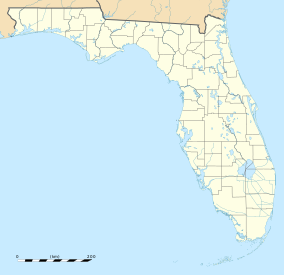
Fort Lauderdale is a coastal city located in the U.S. state of Florida, 30 miles (48 km) north of Miami along the Atlantic Ocean. It is the county seat of and largest city in Broward County with a population of 182,760 at the 2020 census, making it the tenth largest city in Florida. After Miami and Hialeah, Fort Lauderdale is the third largest principal city in the Miami metropolitan area, which had a population of 6,166,488 in 2019.
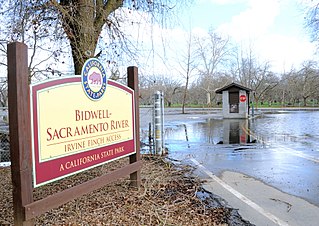
Bidwell–Sacramento River State Park is a state park of California, United States, preserving riparian habitat on the Sacramento River and its tributary Big Chico Creek. The park is located on the border of Butte County and Glenn County. Popular activities include fishing for salmon, steelhead and shad; and floating the river on inner tubes, canoes or kayaks. The 349-acre (141 ha) property was established as a state park in 1979.
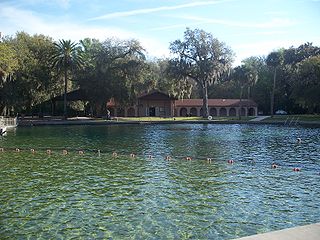
De Leon Springs State Park is a Florida State Park in Volusia County, Florida. It is located in DeLeon Springs, off CR 3.
Blue Spring State Park is a state park located west of Orange City, Florida, in the United States. The park is a popular tourist destination; available activities include canoeing, SCUBA diving, kayaking, fishing, camping, hiking, wildlife watching, and swimming. The spring in the park is the largest on the St. Johns River. Due to its relatively warm temperature of 73 °F (23 °C), the spring attracts many Florida manatees during the winter. About 102 million US gallons (390,000 m3) of water flow out of Blue Spring into the St. Johns River every day.

Fort Snelling State Park is a state park of the U.S. state of Minnesota, at the confluence of the Mississippi and Minnesota rivers. For many centuries, the area of the modern park has been of importance to the Mdewakanton Dakota people who consider it the center of the earth. The state park, which opened in 1962, is named for the historic Fort Snelling, which dates from 1820. The fort structure is maintained and operated by the Minnesota Historical Society. The bulk of the state park preserves the bottomland forest, rivers, and backwater lakes below the river bluffs. Both the state and historic fort structure are part of the Mississippi National River and Recreation Area, a National Park Service site.

Anastasia State Park is a 1,600-acre (6.5 km2) state park in Florida, United States. Its location is on a peninsula on Anastasia Island across Matanzas Bay from downtown St. Augustine along the Atlantic coastal plain. This park has a variety of wildlife, birds and plants in a setting of beaches, tidal salt marsh, and marine and upland hammock.

Bulow Plantation Ruins Historic State Park is a Florida State Park in Flagler Beach, Florida. It is three miles west of Flagler Beach on CR 2001, south of SR 100, and contains the ruins of an ante-bellum plantation and its sugar mill, built of coquina, a fossiliferous sedimentary rock composed of shells. It was the largest plantation in East Florida, and was operated with the forced labor of enslaved Africans and African Americans.

Fort Cooper State Park is a 710-acre historic site in Inverness, Florida, United States. It is located two miles (3 km) south of Inverness, off of U.S. Hwy. 41 on South Old Floral City Road. On June 13, 1972, it was added to the United States National Register of Historic Places. It is also a Florida State Park.

Dr. Von D. Mizell-Eula Johnson State Park is a Florida State Park located in Dania Beach, Florida off Florida State Road A1A. The park is named for late civil rights activists Von Mizell and Eula Johnson, who first pressured Broward County to have at least one beach for African Americans, then led wade-ins in Ft. Lauderdale in 1961 that led to desegregation of the county's beaches the following year. The park's former namesake, John U. Lloyd, served as Broward County Attorney for over 30 years and was instrumental in obtaining the land for the park.
Gamble Rogers Memorial State Recreation Area is a 144-acre (0.58 km2) Florida State Park in Flagler Beach, Florida, United States, between the Atlantic Ocean and the Intra-Coastal Waterway on State Route A1A. It is about 18 miles (29 km) north of Daytona Beach and about 30 miles (48 km) south of St. Augustine.
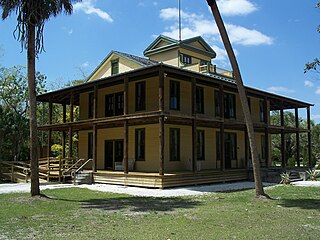
The Koreshan State Historic Site is a state park in Estero, Florida located on U.S. Highway 41 at Corkscrew Road. It was also added to the National Register of Historic Places on May 4, 1976, under the designation of Koreshan Unity Settlement Historic District.

Lake Griffin State Park is a Florida State Park located two miles (3 km) north of Leesburg, in Fruitland Park and 30 miles (48 km) south of Ocala on U.S. Highway 441. It is home to one of the state's largest live oak trees. The park is unique in connecting to Lake Griffin, the Ocklawaha River and thence to the Harris Chain of Lakes, and is made up of 577.63 acres (2.33758 km2) of swampland and hardwood upland.

Lovers Key State Park is a 712-acre (2.88 km2) Florida State Park located on Lover's Key and three other barrier islands—Black Island, Inner and Long Key. It is at 8700 Estero Blvd., Fort Myers Beach, between Big Carlos Pass and New Pass and 10.5 miles (16.9 km) west of Interstate 75 on exit 116. The park lies within the city limits of Bonita Springs and is just north of Bonita Beach. The park uses a Fort Myers Beach zip code for address purposes.

Werner-Boyce Salt Springs State Park is a Florida state park located in Pasco County, Florida near Port Richey, Florida, along the Gulf of Mexico on the Atlantic coastal plain. An entrance to this park is at the intersection of Scenic Drive and Cinema Drive, one mile west of the intersection of Cinema Drive/Ridge Manor Blvd. and U.S. Highway 19. The park is named, in part, for a 320 feet deep saltwater spring in the park, which is not yet easily accessible. The park includes four miles of Pasco County's coastal waters on the Gulf of Mexico.

Rainbow Springs State Park is a Florida state park located on U.S. 41, 3 miles (5 km) north of Dunnellon, Florida. It comprises 1,459.07 acres (5.9046 km2) upland and 12.83 acres (51,900 m2) submerged. The most significant natural feature is the first-magnitude headspring basin, which produces up to 600,000,000 US gallons (2,300,000 m3) of fresh water per day, forming the Rainbow River. The looking-glass waters of Rainbow Springs come from several vents, not one large bubbling spring. The river itself supports a wide variety of fish, wildlife, and plants, many within easy viewing by visitors. In total, the park contains 11 distinct natural communities, including sandhills, flatwoods, upland mixed forests, and hydric hammocks.

Wekiwa Springs State Park is a 7,000-acre (28 km2) Florida State Park in Apopka, Florida. It is located 20 minutes north of Orlando, off Interstate 4 at exit 94, near Altamonte Springs and Longwood. The park also contains the head water of the Wekiva River. It also serves as the headquarters of one of the state's five AmeriCorps Florida State Parks chapters.

Sunrise Boulevard is a 15.6 miles (25.1 km) long east–west highway serving central Broward County mostly designated State Road 838. The road begins at an interchange with the Sawgrass Expressway in Sunrise and continues east to North Ocean Boulevard in Fort Lauderdale, next to Hugh Taylor Birch State Park. For 0.91 miles (1.46 km) in downtown Fort Lauderdale, SR 838 overlaps U.S. Route 1.
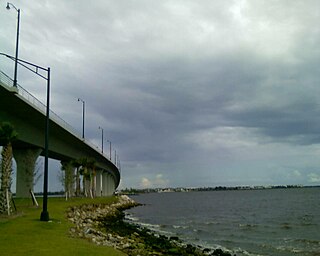
North Hutchinson Island is a coastal barrier island in Indian River and St. Lucie counties on the east coast of Florida in the United States. The island is adjacent to the Atlantic Ocean and is separated from the mainland on the west by the Indian River Lagoon. The portion of the island in Indian River County is known as Orchid Island.

William Randolph Hearst Memorial State Beach is located near the historic town of San Simeon along California State Route 1, in San Luis Obispo County, California, United States. It is named for newspaper magnate William Randolph Hearst (1863–1951), whose family is closely associated with the area.

